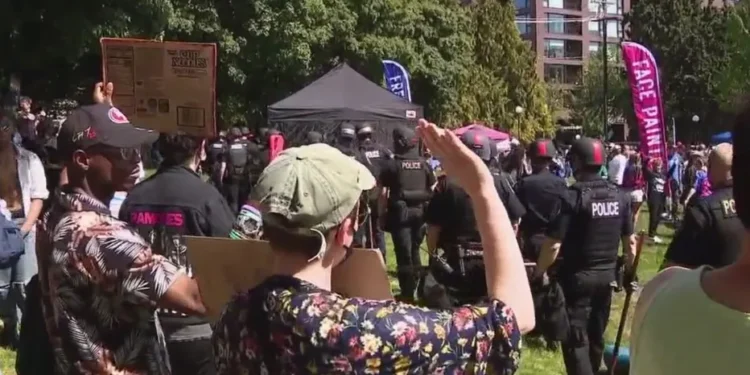In late May 2025, a series of high-profile protests in Seattle led to the arrest of 31 individuals, drawing national attention to ongoing tensions surrounding free speech, religious liberties, and LGBTQ+ rights. The events unfolded over multiple days and involved confrontations between a conservative Christian group and counter-protesters in Capitol Hill and at Seattle City Hall. The volatile situation triggered a broader discussion about civil liberties, police response, and the limits of protest in urban spaces.
The unrest began on Saturday, May 24, when Mayday USA, a conservative Christian advocacy group known for its opposition to abortion and LGBTQ+ rights, organized a rally at Cal Anderson Park. This location holds historic significance for the LGBTQ+ community and was strategically chosen by the group, which describes itself as committed to traditional Christian values. The rally quickly attracted hundreds of counter-protesters from LGBTQ+ advocacy organizations, left-wing coalitions, and civil rights groups. Tensions mounted as verbal exchanges escalated into physical altercations. According to the Seattle Police Department, multiple instances of violence occurred, including assaults, the use of pepper spray, and the throwing of objects at law enforcement officers attempting to de-escalate the situation. As a result, 23 people were arrested on charges ranging from obstruction to assault.
The situation intensified following statements from Seattle Mayor Bruce Harrell, who condemned the violence and described Mayday USA as an “extreme right-wing” organization. The mayor also pointed to the involvement of anarchist elements within the counter-protest crowd. His comments sparked outrage among Mayday USA supporters, who claimed that they were being unfairly targeted for exercising their First Amendment rights. In response, the group organized a second demonstration, dubbed “Rattle in Seattle,” which took place on Tuesday, May 27, on the steps of Seattle City Hall. This protest was framed as a demand for an official apology from Mayor Harrell and a call to uphold religious freedoms and free speech protections.
The City Hall protest also saw significant attendance from counter-protesters, leading to renewed clashes. Seattle police arrested an additional eight individuals, bringing the total number of arrests related to the protests to 31. While no serious injuries were reported, law enforcement maintained a high-profile presence and implemented crowd-control measures to prevent further violence.
Amid growing national attention, the Federal Bureau of Investigation announced it had opened an inquiry into allegations of targeted violence against religious groups during the protests. FBI Deputy Director Dan Bongino emphasized the agency’s commitment to protecting civil liberties, including religious freedom, and stated that a comprehensive investigation would be conducted to determine whether any federal laws were violated.
As of May 29, 2025, the King County Prosecuting Attorney’s Office has not issued formal charges against any of those arrested, citing ongoing investigations and pending reviews of police reports and body camera footage. City officials and community leaders are urging calm while the legal process plays out, though public opinion remains sharply divided.
The Seattle protests have become a focal point in the broader national debate over the limits of protest, the intersection of religious beliefs with public policy, and the evolving landscape of civil rights in the United States. With 31 arrests, a federal investigation, and heightened political scrutiny, the events in Seattle underscore the complexity of balancing constitutional rights with public order in an increasingly polarized society.






